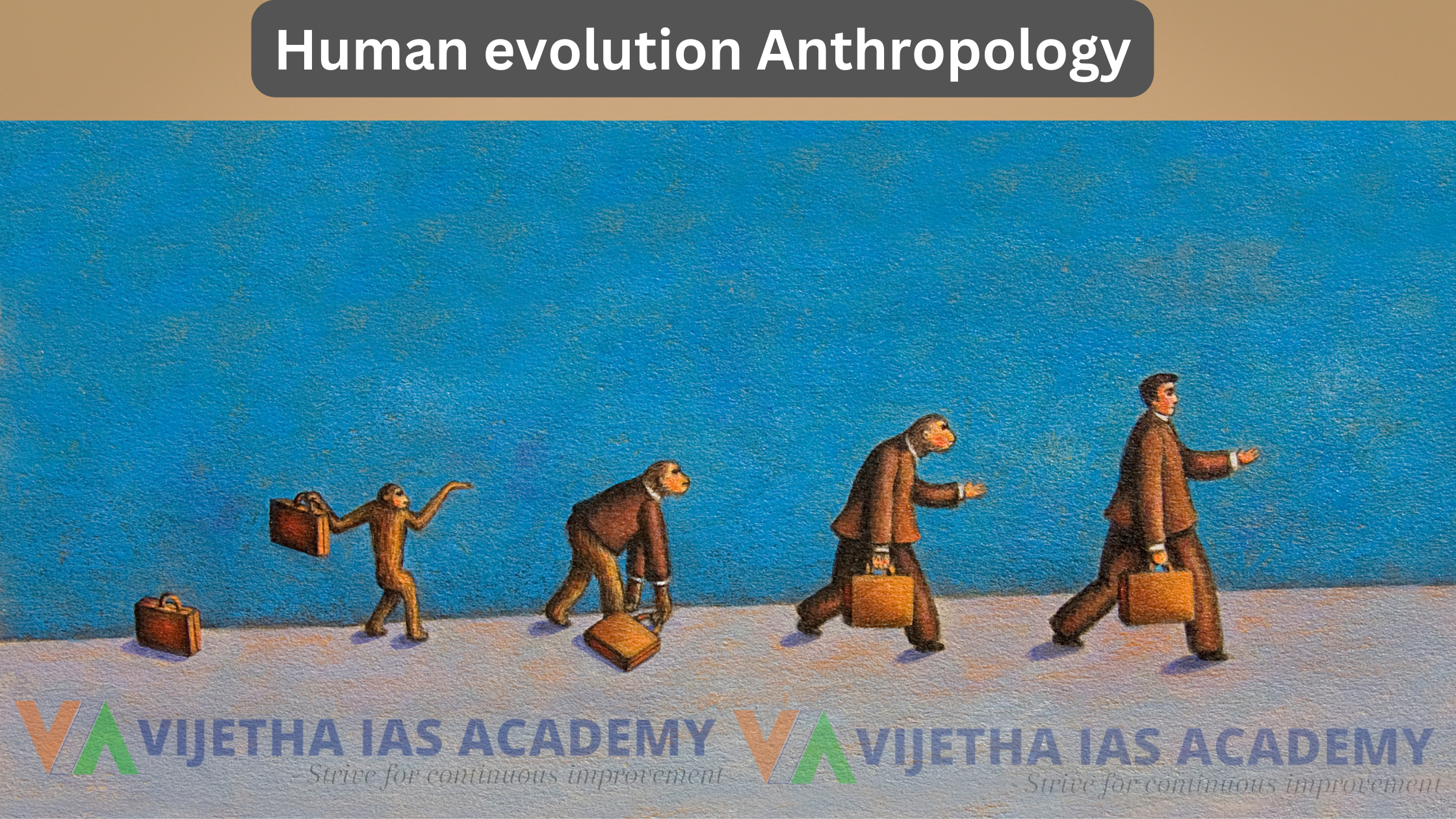
Understanding Human Evolution for UPSC Anthropology Optional
Human evolution is a fundamental topic in anthropology, tracing the biological and cultural development of Homo sapiens from our earliest ancestors. For UPSC aspirants choosing anthropology as an optional subject, a thorough understanding of human evolution is crucial. This comprehensive knowledge not only helps in tackling the anthropology optional paper but also enriches your overall perspective on human history and development. To aid in this endeavor, enrolling in specialized courses like those offered by Vijetha IAS Academy under the expert guidance of Kishore sir can be immensely beneficial.
The Importance of Studying Human Evolution
Broadening Perspectives
Understanding human evolution provides insights into our biological origins, adaptations, and the development of complex behaviors and cultures. This knowledge helps in appreciating the diversity and unity of human species.
Integrative Knowledge
Human evolution integrates knowledge from various disciplines, including biology, archaeology, paleontology, and genetics. This interdisciplinary approach is invaluable for UPSC aspirants as it fosters a holistic understanding of human development.
Relevance to UPSC
Questions on human evolution often appear in the UPSC anthropology optional paper. A solid grasp of this topic can significantly boost your score, as it encompasses key areas of the syllabus such as biological anthropology, prehistory, and the evolution of human societies.
Key Concepts in Human Evolution
1. Theories of Evolution
Charles Darwin and Natural Selection
Darwin’s theory of natural selection posits that organisms with favorable traits are more likely to survive and reproduce, passing these traits to the next generation. This process leads to the gradual evolution of species over time.
Modern Synthesis
The modern synthesis integrates Darwin’s theory of natural selection with Mendelian genetics. It explains how genetic variations occur through mutations and recombination, and how these variations are acted upon by natural selection.
2. Hominid Evolution
Australopithecines
The Australopithecines are among the earliest known hominids, dating back to around 4 million years ago. Famous specimens like "Lucy" (Australopithecus afarensis) provide evidence of bipedalism, a key adaptation in human evolution.
Homo Habilis
Homo habilis, dating from approximately 2.4 to 1.4 million years ago, is often considered the first member of the genus Homo. Known as "handy man,"this species is associated with the use of simple stone tools, marking the beginning of the Paleolithic era.
Homo Erectus
Homo erectus emerged around 1.9 million years ago and is notable for its larger brain size, use of more sophisticated tools, and control of fire. This species is believed to have been the first to migrate out of Africa, spreading across Asia and Europe.
Neanderthals (Homo Neanderthalensis)
Neanderthals, who lived from about 400,000 to 40,000 years ago, were adapted to cold climates and had robust physiques. They are known for their complex tool technology (Mousterian), burial practices, and possible symbolic behaviors.
Homo Sapiens
Homo sapiens, our own species, appeared around 300,000 years ago in Africa. Characterized by advanced cognitive abilities, language, and cultural complexity, Homo sapiens have spread across the globe, developing diverse societies and cultures.
3. Key Developments in Human Evolution
Bipedalism
The shift to bipedalism is a hallmark of human evolution. It allowed early hominids to travel efficiently, free their hands for tool use, and adapt to changing environments.
Tool Use and Technology
The development of tools marks significant milestones in human evolution. From the simple Oldowan tools of Homo habilis to the sophisticated Acheulean handaxes of Homo erectus and the diverse technologies of Homo sapiens, tool use reflects cognitive and cultural advancements.
Brain Expansion
The increase in brain size and complexity is another critical aspect of human evolution. This expansion is linked to enhanced cognitive abilities, language development, and social behaviors.
Social and Cultural Evolution
Human evolution is not just biological but also cultural. The development of language, art, religion, and social structures has played a crucial role in shaping human societies.
Enhancing Your Preparation with Vijetha IAS Academy
To master the complexities of human evolution, enrolling in specialized courses can be highly beneficial. Vijetha IAS Academy offers comprehensive courses tailored for UPSC aspirants, under the expert guidance of Kishore sir.
Benefits of Enrolling in Vijetha IAS Academy
- Expert Guidance: Learn from experienced educators like Kishore sir, who provide in-depth knowledge and practical insights into human evolution.
- Structured Curriculum: Follow a well-organized syllabus that systematically covers all essential topics, ensuring thorough preparation for the anthropology optional paper.
- Interactive Learning: Engage in discussions, doubt-clearing sessions, and interactive classes that enhance understanding and retention.
- Regular Assessments: Benefit from regular mock tests and practice papers to evaluate your progress and identify areas for improvement.
- Practical Exposure: Gain insights through case studies and real-life examples that bridge the gap between theoretical knowledge and real-world applications.
Integrating Human Evolution into Your Study Plan
Focused Study Sessions
Dedicate specific study sessions to each stage of human evolution. Make detailed notes, including key fossils, dates, and characteristics of different hominid species.
Use Visual Aids
Utilize diagrams, timelines, and phylogenetic trees to visualize the evolutionary relationships and key developments in human evolution.
Practice Answer Writing
Regularly practice writing answers to previous years' questions and mock tests. Focus on structuring your answers well, using specific examples to support your arguments, and critically engaging with the topics.
Reflective Practice
Reflect on how the study of human evolution relates to contemporary issues and current affairs. This will help you develop a nuanced understanding of the subject, which is essential for the UPSC exam.
Conclusion
Understanding human evolution is fundamental for UPSC aspirants opting for anthropology as their optional subject. It provides critical insights into our biological and cultural development, enhancing analytical skills and interdisciplinary knowledge.
Enrolling in specialized courses like those offered by Vijetha IAS Academy and leveraging the expertise of Kishore sir can significantly enhance your preparation. Approach the UPSC exam with confidence, equipped with a comprehensive understanding of human evolution and its implications for contemporary human societies.
